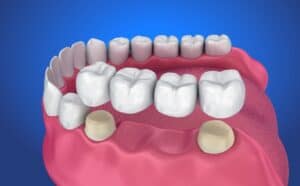 It can be embarrassing to have a gap in your smile due to a missing tooth, but there is a handy solution for this problem: a dental bridge. A bridge is a prosthetic device that creates a literal bridge over the gap with artificial teeth. It can fill in a single missing tooth or multiple missing teeth in a row.
It can be embarrassing to have a gap in your smile due to a missing tooth, but there is a handy solution for this problem: a dental bridge. A bridge is a prosthetic device that creates a literal bridge over the gap with artificial teeth. It can fill in a single missing tooth or multiple missing teeth in a row.
Dr. Karen Tiwana has found that dental bridges are one of the most effective ways to restore a full smile. At Chatham Dental Arts in Pittsboro, North Carolina, she can determine whether a dental bridge is the right solution for your mouth following an examination.
Are You a Candidate for a Dental Bridge?
A dental bridge is a great solution for most patients with a gap in their smiles due to missing teeth. It is a great choice for patients who would prefer a less expensive and less invasive alternative to dental implants. For most types of dental bridges, it is important to have at least one healthy tooth next to the gap to help secure the bridge.
What Are the Benefits of a Dental Bridge?
Replacing a missing tooth with a dental bridge has many advantages. To start, it makes eating significantly easier. Chewing can be challenging without a full set of teeth, and you may adjust your bite to avoid using part of your mouth, which can be painful and cause damage. Having a bridge allows you to eat in a normal manner.
Talking also becomes easier. While missing teeth can cause speech impediments or slurring, a dental bridge can help correct these issues.
Dental bridges also have aesthetic benefits. The artificial teeth used in bridges look like real teeth (custom created to match the size, color and shape of your natural teeth) so you can maintain an attractive smile that looks normal. Filling in the gap also stops your face from developing a “sunken” appearance that is known to happen with missing teeth. Furthermore, it stops your adjacent teeth from drifting out of place, which can dramatically alter the alignment of your teeth.
What Is the Dental Bridge Procedure Like?
Since most dental bridges involve dental crowns, Dr. Tiwana begins by resizing the natural teeth adjacent so that she can place crowns on top. She then takes a mold of your teeth so that a laboratory can create a custom bridge that fits in your mouth. A few weeks later when the bridge has been created, you return to Chatham Dental Arts to verify that the bridge fits, at which point Dr. Tiwana securely attaches the crowns to hold the bridge in place.
What Are the Types of Dental Bridges?
Dr. Tiwana offers four types of dental bridges to accommodate a wide range of patients. They include:
Fixed Bridge
This is the most-used option. Dr. Tiwana attaches a crown to the teeth on each side of the gap so that the prosthetic teeth are held in place.
Cantilever Bridge
A cantilever bridge relies on a single crown to hold the prosthetic teeth in place. This makes it slightly less secure, but it can be preferable if you do not have the teeth in place to hold a second crown or if you would prefer to have fewer crowns.
Maryland Bridge
A Maryland bridges allows you to avoid crowns altogether by using porcelain that secures to the back of the natural teeth to hold the bridge in place. Teeth must be present on both sides of the gap being filled for this style to work.
Implant-Supported Bridge
 This bridge relies on dental implants instead of crowns to hold the bridge in place. While this bridge type is a more involved process than the other bridges, it can successfully cover a longer gap of missing teeth without requiring a dental implant for each vacant space.
This bridge relies on dental implants instead of crowns to hold the bridge in place. While this bridge type is a more involved process than the other bridges, it can successfully cover a longer gap of missing teeth without requiring a dental implant for each vacant space.
Discuss Dental Bridges with an Expert Dentist
Patients with missing teeth are glad they put their faith in Dr. Tiwana to fix the problem with a durable, affordable solution like dental bridges. If you would like to meet one of NC’s most talented dentists so she can examine your mouth, please schedule an appointment at Chatham Dental Arts by calling (919) 542-4911 today.


